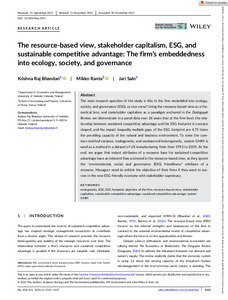The resource-based view, stakeholder capitalism, ESG, and sustainable competitive advantage : The firm's embeddedness into ecology, society, and governance
Bhandari, Krishna Raj; Ranta, Mikko; Salo, Jari (2022-01-20)
Bhandari, Krishna Raj
Ranta, Mikko
Salo, Jari
Wiley
20.01.2022
Julkaisun pysyvä osoite on
https://urn.fi/URN:NBN:fi-fe202301031312
https://urn.fi/URN:NBN:fi-fe202301031312
Kuvaus
vertaisarvioitu
© 2022 The Authors. Business Strategy and The Environment published by ERP Environment and John Wiley & Sons Ltd. This is an open access article under the terms of theCreative Commons Attribution‐NonCommercialLicense, which permits use, distribution and reproduction in anymedium, provided the original work is properly cited and is not used for commercial purposes.
© 2022 The Authors. Business Strategy and The Environment published by ERP Environment and John Wiley & Sons Ltd. This is an open access article under the terms of theCreative Commons Attribution‐NonCommercialLicense, which permits use, distribution and reproduction in anymedium, provided the original work is properly cited and is not used for commercial purposes.
Tiivistelmä
The main research question of the study is this: Is the firm embedded into ecology,society, and governance (ESG), or vice versa? Using the resource-based view as a the-oretical lens, and stakeholder capitalism as a paradigm anchored in theDashgupatReview, we demonstrate in a panel data over 26 years that at the firm level, the rela-tionship between sustained competitive advantage and the ESG footprint is concaveshaped, and theimpact inequality multiplegaps of the ESG footprint are 4.75 timesthe providing capacity of the natural and business environment. To solve the com-mon method variance, endogeneity, and unobserved heterogeneity, system GMM isused as a method in a dataset of US manufacturing firms from 1992 to 2019. At theend, we argue that extant attributes of a resource base for sustained competitiveadvantage have an inherent flaw anchored in the resource-based view, as they ignorethe“environmental, social, and governance (ESG) friendliness”attribute of aresource. Managers need to rethink the objective of their firms if they want to sur-vive in the new ESG-friendly economy with stakeholder supremacy.
Kokoelmat
- Artikkelit [2609]
